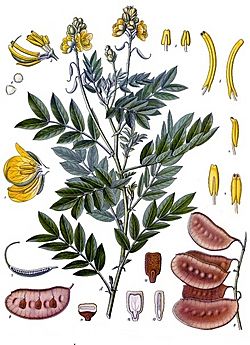Caesalpinioideae facts for kids
Quick facts for kids Caesalpinioideae |
|
|---|---|
 |
|
| Senna alexandrina Köhler's Medizinal-Pflanzen | |
| Scientific classification | |
| Kingdom: | |
| Division: | |
| Class: | |
| Order: | |
| Family: | |
| Subfamily: |
Caesalpinioideae
|
| Tribes | |
|
Casieae |
|
Caesalpinioideae (say: sez-al-pin-ee-OY-dee-ee) is a big group of flowering plants. They are a "subfamily" within the larger Fabaceae family, which is also known as the legume family. Think of it like a big family tree, where Caesalpinioideae is one of the main branches.
Plants in this subfamily often have flowers that are "zygomorphic." This means their flowers are like a mirror image if you cut them in half one way, but not if you cut them another way. Imagine a human face – it's symmetrical, but only if you cut it vertically down the middle. Many flowers, like orchids or snapdragons, have this kind of special shape.
What are Legumes?
The Fabaceae family, which includes Caesalpinioideae, is also called the legume family. Legumes are special because many of them have pods that contain seeds, like peas, beans, and peanuts. These plants are very important for food and for making the soil healthier.
How Scientists Group Plants
Scientists use different ways to group plants together based on their features and how they are related. This helps them understand the plant kingdom better. For example, some older ways of grouping plants put Caesalpinioideae in its own separate family. But newer methods, like the one used by the Angiosperm Phylogeny Group, consider it a subfamily within the larger Fabaceae family. This shows how our understanding of plants can change as scientists learn more!
Images for kids
See also
 In Spanish: Caesalpinioideae para niños
In Spanish: Caesalpinioideae para niños
 | Roy Wilkins |
 | John Lewis |
 | Linda Carol Brown |


